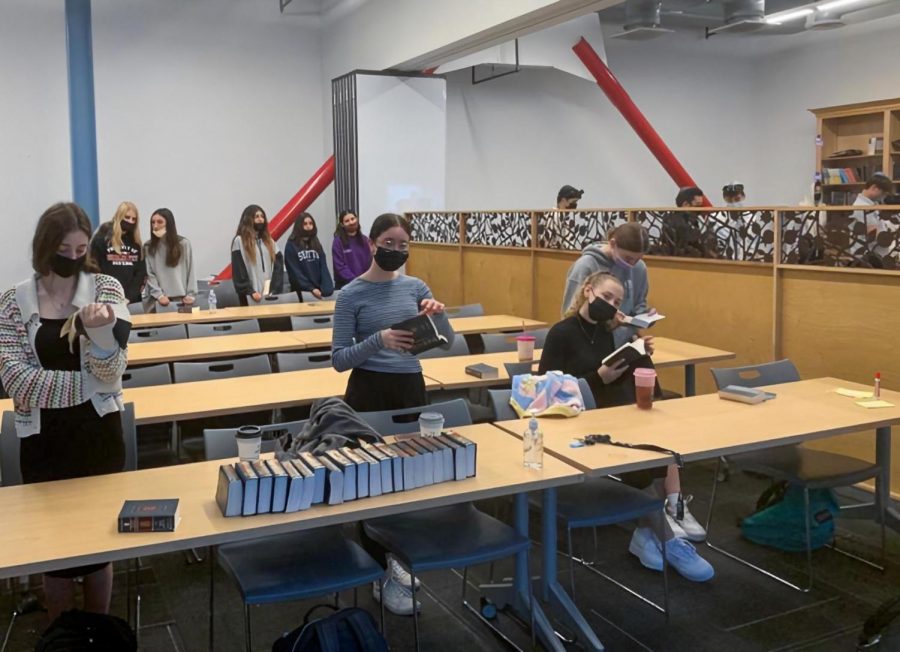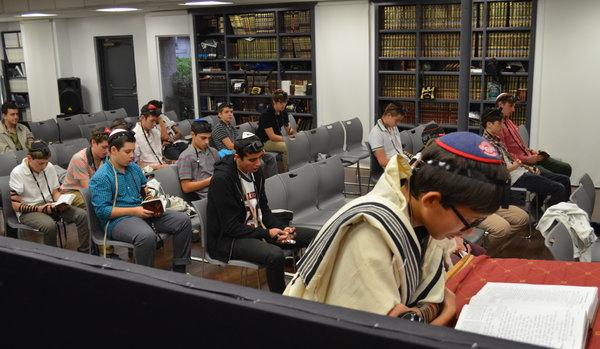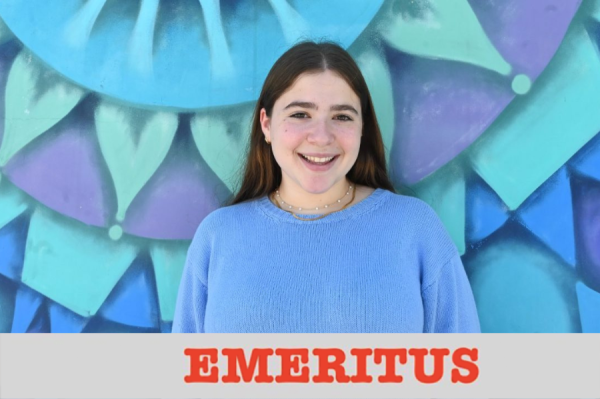Administration ends Hashkama Minyan except for honors tracks
Officials hope to transfer culture of popular student-led service to schoolwide main minyan; davening electives also ended
SPACE: Hashkama Minyan Sept. 14 was less crowded than in previous years, when more than 100 people would attend. This year’s early-morning prayer service is open only to students in Advanced Gemara Shiur or Beit Midrash Track.
October 7, 2021
Hashkama Minyan, an early-morning daily prayer service that began at 7:20 a.m and was offered to all students beginning in 2013, has now been made exclusive to students in AGS (Advanced Gemara Shiur) and BMT (Beit Midrash Track), and eligible students may attend only on the day or days they have class.
In previous years, along with Hashkama students were given a variety of choices for Shacharit, the morning prayer service. During 2019-20, the 9 a.m. “main” minyan was complemented with three electives: Explanatory Minyan, Girls Singing Minyan, and Meditation Minyan.
These electives also have been discontinued.Now, the options have been reduced to Ashkenazic and Sephardic, which follow the traditions of Northern Europe (Ashkenazic) or Southern Europe, Africa and the Middle East (Sephardic).
The new davening policy was announced as a change to the Student Handbook on Aug. 4. A schoolwide email about the change said it was because officials liked the more unified davening that resulted from last year’s Covid regulations.
“Based on the success of our daily minyanim during the past school year, all students will be davening together every morning in one of two ‘main’ minyanim (one Ashkenazi and one Sephardic) after first period,” stated the email. “This will allow us to continue building a beautiful culture of b’rov am hadrat melech (there is greater honor in a large congregation) by having all of our students daven together each morning.”
Rabbi David Stein, Director of Curriculum, Instruction and Judaic Studies, said the decision was made jointly by Head of School Rabbi David Block, Chief Operating Officer Sarah Emerson, Principal Mr. Daniel Weslow and Rabbi Stein.
“Pretty straightforward in terms of the rationale,” Rabbi Stein said, “which was that we did it last year where we didn’t have the electives, and we all had two minyanim. And everyone was davening in them every day, and we really said we want to have our school together, we want to have everybody at the same time.”
But Dean of Students Rabbi Ari Schwarzberg offered an additional reason. He said some students used the existence of Hashkama to avoid going to morning prayers altogether.
“Now granted that was a very small percentage,” Rabbi Schwarzberg said. “But what it did is that it created something where faculty needed to do more police work, rather than do what faculty should do, which means davening and educating and forming relationships with our students.”
Meanwhile, he said, Hashkama had become so popular that the 9 a.m. main minyans became too small.
“Our regular minyan ended up being a little bit schvach [bland or weak] because it was just a very small minyan,” Rabbi Schwarzberg said.
Student reactions ranged from frustration to disappointed support. Before Covid, nearly half the school would attend. The rooms were packed and it could be a struggle to find a chair.
Senior Talia Namvar was hesitant to welcome the change at first but understood why it was made.
“At first I thought it was a bad idea because when I was a freshman, a part of what made Shalhevet Shalhevet was that breakfast period,” said Talia. “But now I guess I kind of understand their reasoning, because with Hashkama Minyan when everyone could go to it, a lot of kids wouldn’t end up going to davening. There would be kids that would want to see their friends during breakfast period so they wouldn’t go to davening, but now you don’t really have that option. So I get where the faculty was coming from.”
Senior Benny Blacher struggled to understand the school’s reasoning behind it.
“I think it’s a little frustrating for kids who have been going to Hashkama davening throughout their Shalhevet experience,” said Benny. “If the objective of this rule is to have the whole school come and daven together as a community…, why are AGS kids not part of the school and community? Why are they exempt?”
Rabbi Stein said having the entire school davening together was not possible logistically.
“We spent a lot of time experimenting,” Rabbi Stein said. “Like could we have a later start to AGS at 8 a.m. and push the day later so that really everyone would be together for davening? It didn’t work out, scheduling-wise and with the timing of all of the classes.”
Another student, who did not want to share his name, felt that there should have been more student input on the decision.
“It just feels like they cheated us a little bit,” said the anonymous student. “I know they didn’t, but it was created by the students, started by the students, and run by the students, and they just took it away without really consulting the students, at least not a majority of them. So it was annoying, it still is annoying.”
Agenda Chair Jack Sanders confirmed that Just Community committees were not involved. He said during the summer, Rabbi Schwarzberg sent text messages and then led a Zoom meeting of six to eight seniors to discuss it. He couldn’t remember exactly who was there.
“It was Rabbi Schwarzberg coming at a very open-ended means to try and find an answer to this davening issue,” said Agenda Chair Jack Sanders. “Some were just kids in the grade, some were leaders. “I think overall the Zoom was just there for the purpose of gathering opinions on it, and to propose it to a few students of different groups and see how they would react.”
The students were not asked to vote on it, and Jack was not asked to raise it at Town Hall.
“It was mostly handled by the higher-ups,” said Jack. “But I think parts were definitely influenced by our discussions.”
Rabbi Schwarzberg said that was by design. He said prayer is part of curriculum, which along with secular law and halacha is outside the reach of Just Community involvement.
“Matters like tefillah are part of the curriculum of the school,” Rabbi Schwarzberg said, “and according to the Just Community constitutional rights, this is not something that is voted on by the Just Community.”
He also said Just Community benefits came with responsibilities.
“This school is all about empowering students and teaching them the responsibility,” said Rabbi Schwarzberg. “The Just Community means that things need to work in partnership, so if students want something that benefits them, they also have to show that they are willing to take full responsibility for that. And that’s not just 20 students, it has to be everyone.”
The end of Hashkama minyan was quite different from its beginning. It was founded in 2013 by then-sophomore Noah Rothman, ‘15, who said it was started as a way for early comers to connect to davening in a student-run environment. No teachers were invited.
Mr. Rothman, an assistant and Ed Support teacher for Judaic Studies this year, said the minyan began with roughly 10 people attending, but it continued to grow and at one point had about 120 students in attendance.
“[It was] for any student who wants to be in a serious davening environment where it’s focused on the tefillah, where there’s no faculty present,” Mr. Rothman said. “One of the reasons it worked is that some people can be off-put by having faculty around, and even though it was uncomfortable for me and other people to be telling people to be quiet, it was always taken differently when it was coming from, like, me as opposed to when it comes from a rabbi.”
Rabbi Stein is hopeful that the student initiative can continue in the main minyanim.
“What I’m hoping is that we’re gonna be able to take that student leadership culture and actually transfer it into the main minyan,” said Rabbi Stein. “That same culture, that same engagement. There’s no reason why the teachers should need to run the main minyan.
“That’s really the reason why we set it up the way we did — where sure, there’s staff that’s there, but the tefillah, running the minyan, the gabbaim, all of that is student-led. I think that the real opportunity here is to have that kind of culture — to build a culture of students actually really being involved in the main minyan just as much as we had in the Hashkama.”
Correction: The headline in the print edition of this story was misleading. It should have stated that administration had closed Hashkama Minyan to most students, not that Hashkama Minyan had been ended.
















